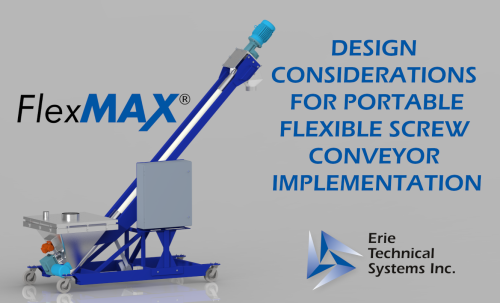Design Considerations for Portable Flexible Screw Conveyors
Portable flexible screw conveyors are an essential tool for many industries, offering the flexibility to move bulk materials efficiently and conveniently. Their portability makes them ideal for applications where materials need to be transported between different locations within a facility or even between sites. This article explores the key design considerations for portable flexible screw conveyors to ensure optimal performance and reliability.
Understanding Portable Flexible Screw Conveyors
Portable flexible screw conveyors consist of a rotating helical screw inside a flexible tube, driven by an electric motor. The screw's rotation moves the material through the tube, allowing for efficient and controlled transport. The portability of these conveyors is achieved through features such as wheels, handles, and lightweight construction, making them easy to move and position as needed
Key Design Considerations
- Hopper Size & Type: The smallest practical size from the standard sizes of hopper should be selected to reduce the overall weight of mateiral in the portable flexible screw conveyor. Flexible screw conveyor hoppers are availble in 4, 8 or 12 cu. ft standard sizes.
-
Mobility Features: Design elements such as sturdy wheels and forklift pockets can be incorporated into the portable base frames. For wheeled units, large wheels reduce the force needed to move the conveyor and allow movement over non-smooth surfaces. Ergonomic handles and lightweight construction increase mobility. Additionally, quick-release clamps and modular components allow for easy disassembly, transport, and reassembly.
- Discharge Height: The discharge height needs to be limited for portable flexible screw conveyors. These conveyors run at a 45o angle and each foot of elevation adds an additional foot of portable base. Ideally portable flexible screw conveyors should be under a 12' discharge for stability and practicality for a single operator to move the conveyor.
-
Power Supply: Portable conveyors will require quick disconnects rated for the equipment power. A mating receptacle should be installed at each location where the conveyor will be run.
-
Ease of Cleaning and Maintenance: For industries with strict hygiene standards, such as food processing and pharmaceuticals, the ability to clean and maintain the conveyor easily is essential. Design features such as quick-release fittings, smooth surfaces, and easy access to internal components facilitate thorough cleaning and reduce downtime. Additionally, a tilting design increases safety and the ability
-
Capacity and Throughput: The conveyor's capacity and throughput must match the application's requirements. Factors such as screw diameter, pitch, and rotational speed influence the conveyor's capacity. Ensuring the design can handle the desired material flow rate is critical for efficient operation
-
Safety Features: Safety is paramount in conveyor design. Features such as emergency stop buttons, protective guards, and overload protection mechanisms help prevent accidents and ensure safe operation. Additionally, enclosed designs help contain dust and protect operators from exposure to hazardous materials
-
Environmental Considerations: The operating environment can impact the conveyor's design. For example, outdoor applications may require weather-resistant materials and components, while indoor applications may prioritize noise reduction and compact design. Understanding the environmental conditions helps in selecting the appropriate design features.
-
Testing and Validation: Conducting tests with the actual material in a full-size conveyor helps predict performance and identify potential issues. This step is crucial for ensuring the conveyor system meets the specific requirements of the application and operates reliably under real-world conditions
Conclusion
Portable flexible screw conveyors offer a versatile and efficient solution for transporting bulk materials across various locations. By considering factors such as material compatibility, mobility features, power supply, ease of cleaning, capacity, safety, and environmental conditions, you can design a conveyor system that meets your specific needs. Understanding these design considerations will help ensure optimal performance, reliability, and safety for your portable flexible screw conveyor.




